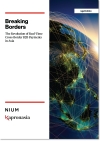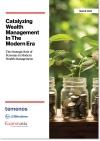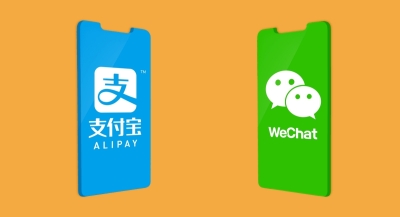Latest Insight
- Why cash is still prevalent in Asia
- Japan steps up green finance efforts
- South Korea charts middle path on crypto
- Should Grab and GoTo merge?
- Singapore pushes ahead with fintech-driven sustainability
- Digital banks in South Korea continue to thrive
- Billease is the rare profitable BNPL firm
- Fintech sector in Pakistan faces mounting challenges
- Where digital banks in Asia can make a difference
- Cashless payments jump in Vietnam
Latest Reports
-
Breaking Borders
 Despite progress in payment systems, the absence of a unified, cross-border Real-Time Payments (RTP) network means that intermediaries play a crucial role in facilitating connectivity. This report examines the ongoing complexities, challenges, and initiatives in creating a seamless payment landscape across Asia. Innovate to Elevate
Despite progress in payment systems, the absence of a unified, cross-border Real-Time Payments (RTP) network means that intermediaries play a crucial role in facilitating connectivity. This report examines the ongoing complexities, challenges, and initiatives in creating a seamless payment landscape across Asia. Innovate to Elevate In the dynamic and diverse financial landscape of the Asia-Pacific (APAC) region, banks are at a pivotal juncture, facing the twin imperatives of innovation and resilience to meet evolving consumer expectations and navigate digital disruption. Catalyzing Wealth Management In The Modern Era
In the dynamic and diverse financial landscape of the Asia-Pacific (APAC) region, banks are at a pivotal juncture, facing the twin imperatives of innovation and resilience to meet evolving consumer expectations and navigate digital disruption. Catalyzing Wealth Management In The Modern Era Hyper-personalized wealth management presents a paradigm shift from traditional models relying on static, generalized segments. Developing tailored investor personas based on psychographics, behaviours and fluid financial goals enables financial institutions to deliver rich and tailored customer experiences that resonate with next-generation priorities.
Hyper-personalized wealth management presents a paradigm shift from traditional models relying on static, generalized segments. Developing tailored investor personas based on psychographics, behaviours and fluid financial goals enables financial institutions to deliver rich and tailored customer experiences that resonate with next-generation priorities.
Events
| April 23, 2024 - April 25, 2024 Money 2020 Asia 2024 |
| October 21, 2024 - October 24, 2024 Sibos Beijing |
| November 06, 2024 - November 08, 2024 Singapore Fintech Festival |
U.S. payments giant Stripe has had its eye on the Asia-Pacific region for a long time, both mature markets like Japan and Australia, and emerging economies in Southeast Asia. It sees enormous potential in the region, despite the intense competition in the payments segments there. However, the global tech slump may force the company to slow the speed of its expansion as it works to cut costs. Earlier this year, Stripe’s US$95 billion valuation reportedly fell 28% after an internal recalculation. Then came the layoffs.
China embarked on a quest to internationalize its currency in the early 2010s with great fanfare. In support of renminbi internationalization, Beijing announced plans to develop Shanghai as a global financial center and established offshore yuan trading hubs in Hong Kong, Singapore and London.
These efforts represented a push by reform-minded officials to give China a greater role in international finance and activate needed changes to a financial system designed for a country less integrated with the global economy. They came about at a time when it was widely assumed that China’s leadership believed the advantages of a more open financial system outweighed the drawbacks, and that a free-floating renminbi and fully convertible capital account were not a question if, but when.
Among Hong Kong’s eight virtual banks, WeLab Bank stands out for a few reasons. First, it is not simply an offshoot of large tech firms and/or incumbent lenders like most of its competitors. WeLab is a startup that was established a decade ago as an online consumer credit lending platform. It has been operating in mainland China since 2014 and Southeast Asia since 2018. Though the mainland market is and will remain important for WeLab, its interest in Southeast Asia – Indonesia in particular – shows the company has a regional vision for its business that contrasts with that of its competitors focused only on Hong Kong and the mainland.
Cambodia has been on the gray list of the international financial crime watchdog FATF for several years due to its inadequate money laundering and counterterrorism financing (CFT) controls. Gray list designation requires additional levels of compliance for international financial transactions with the kingdom, which while not a dealbreaker for foreign investment in Cambodia, makes it more troublesome than in countries not on the list. As Cambodia emerges from the pandemic, it is eager to be removed from the gray list to help boost its Covid-battered economy, which contracted 3.1% in 2020 and grew just 2.6% in 2021.
Across the Asia-Pacific region, digital banks have sprung up at a rapid rate in recent years. Regulators have ostensibly encouraged the establishment of online-only banks to spur greater competition in the banking sector, which in most markets is dominated by incumbent lenders afflicted with complacency of varying severity.
Historically, Chinese companies seeking to go public overseas have listed in the United States, home to the world’s most liquid capital markets. Nothing can quite compare with listing on the New York Stock Exchange (NYSE) or Nasdaq. While that remains the case, the fraught U.S.-China relationship has caused Chinese firms to turn their focus to European stock exchanges, especially Switzerland’s SIX. In Europe, Chinese companies can mostly steer clear of geopolitical tensions while still being able to access global investors.
China’s fintech sector was never the same after November 3, 2020. That was the day Chinese regulators abruptly nixed Ant Group’s mega IPO, a dual Shanghai and Hong Kong listing that was expected to raise US$37 billion and value the Chinese fintech giant at a whopping US$315 billion. The cancellation of Ant’s IPO proved to be the beginning of an extended campaign to curb the dominance of Big Tech in China’s financial services industry.
BNPL, or buy now pay later, is a type of payment option that allows customers to purchase items now and pay for them later in installments. This type of payment option has been gaining popularity in recent years, especially among younger shoppers. In fact, a recent study showed that BNPL usage has increased by 400% among millennials in the past two years.
BNPL first emerged in Asia in 2014 and has since become extremely popular in countries like China, South Korea, and Singapore. In China, for example, the BNPL market is expected to grow from $30 billion in 2020 to $750 billion by 2025. It could be argued that Australia was the epicentre of BNPL in Asia with such previous market leaders including Afterpay and Zip. So, what is driving this massive growth? Let's take a closer look at BNPL in Asia and how it works.
The Hong Kong financial center lexicon is ever expanding. Depending whom you ask, Hong Kong is an international financial center, Asia’s most important financial center, China’s offshore financial center or some combination of all three. Historically, Hong Kong liked to stay out of politics and thrived on its combination of laissez-faire capitalism, strong, independent legal system and knack for acting as a bridge to the Chinese mainland. Going forward, those factors will remain integral to Hong Kong’s success, but important questions remain about how economic and financial policy choices on the mainland will affect the city’s fortunes.
The Philippines recently experienced a setback in its fight against financial crime: The Financial Action Task Force (FATF) declined to remove the Southeast Asian country from its grey list, on which it was placed in June 2021 for having inadequate money-laundering and counterterrorism financing controls. After a two-day plenary in October, Paris-based FATF decided to keep the Philippines on the list along with 22 other jurisdictions.
More...
The newest digital bank in Singapore stealthily came into existence, flying below the radar in contrast to the high-profile race for digital banking licenses that ended with victories by Grab-Singtel, Sea, Ant Group and a consortium headed by China’s Greenland Holdings. Now competing with these four digital banks is Trust Bank, launched in September by Standard Chartered and NTUC FairPrice, Singapore’s largest supermarket chain.
Thailand has never been in a rush to introduce digital banks. After all, the kingdom is neither a financial center like Hong Kong or Singapore, nor does it have a huge unbanked population likes Indonesia and the Philippines. About 81% of Thais have a bank account. However, it is possible that introducing online banks could improve competition in Thailand’s financial sector – and that appears to be one of the key goals of the Bank of Thailand (BoT) as it moves forward on digital banks.
Being placed under increased monitoring by the Financial Action Task Force’s (FATF) is never welcome news for a country. Besides the reputational damage that comes along with such a designation, there are many practical problems caused by the restrictions that may be put on financial transactions as well as burdensome compliance requirements. Most countries are put on FATF’s gray list due to inadequate money laundering and counterterrorism financing controls. However, occasionally a country is added to the blacklist – reserved for the countries that pose the most serious financial crime risks – including North Korea and Iran – which is what happened to Myanmar last month.
A commentary in collaboration with Banking Circle.
Cross-border payments are increasingly characterized by a dynamic and challenging market environment. On the one hand, the market is booming and expected to reach US$156 trillion this year. On the other, traditional international correspondent banking networks are shrinking at the same time that alternative rails that execute payments in real time are increasingly common. Thus, financial institutions (FIs) have more choice than ever, but being able to connect seamlessly to all the rails is not straightforward.
The proof of the tentative state of Australia’s bid to introduce greater competition into its financial services sector is in the pudding: The country’s big four incumbent lenders have increased in size despite the high-profile launches of different neobanks in recent years. Of that crop of upstarts, the last one left standing is Judo Bank. The others have either collapsed or been acquired. Meanwhile, the big four are arguably stronger than ever.















